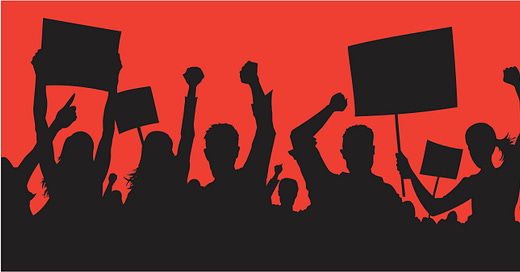Weekend reads: Identitarian moralism
What we're talking about when we talk about the modern left
Hello reader! It’s June, so Lean Out is off on our annual summer hiatus to rest and recharge (and unplug from all news). This year, instead of going dark for a few weeks, we’ll be reprinting some of our most popular essays, including this one, on what happened to the left. — TH
In recent months, it’s become clear to me that nobody has any idea what we’re talking about when we talk about the modern left.
The old left was anti-establishment, anti-war, anti-corporate interests, pro-union, pro-working class, pro-civil liberties, and most especially pro-free speech. The new left, as Canadian comedian Ryan Long jokes, is sponsored by Amazon.
Now, I know from experience that saying such things enrages the few actual leftists still out there, who rightfully point out that the corporate pseudo-leftists that co-opt social justice rhetoric — scathingly referred to in socialist circles as “centrists” — are not leftists at all. This is true, but the distinction is often lost in the current discourse.
Then, too, there’s the matter of very young, very online leftist activists, who could rep for either the old leftists or the new corporate ones, depending on the day, or mood, it’s anyone’s guess.
Adding to the incomprehensibility of this amalgamated, amorphous new left is the fact that its rules, language, and positions change with dizzying speed. And, since it’s keen to banish heretics, its membership is constantly shifting, with past members frequently smeared as “right wing” and sent off to social Siberia.
All of this confusion has given conservatives an opening to lump together anyone and everyone who self-identifies as left under the “woke” umbrella.
The ongoing question, then, becomes: What exactly is the modern left? Is it about traditional leftist values and fighting to improve the material conditions of people’s lives? Or, does it come down to how one views oneself?
From what I can tell, many of the new left’s decision-makers are highly educated, wealthy, well-meaning, and entirely cut off from the working class, save for a few quick Uber Eats handoffs. And while this version of the left takes increasingly radical positions on cultural and social issues, it is largely uninterested in pursuing leftist economic policies.
This new left now seems to run much of academia, tech, the arts, and the non-profit sector. (And, not for nothing, our federal government here in Canada.)
Still, if you make the claim that the left is dominant right now, you are both technically right and sorely mistaken. Yes, the “left” currently holds a tremendous amount of power. But no, that “left” does not subscribe to anything that resembles a traditionally leftist agenda.
All of this is, of course, communicated poorly to the public through the media, which is made up primarily of the new left, but doesn’t know it.
One term I’ve heard lately that’s helpful in unpacking the new left is “identitarian moralism.” This phrase captures the new left’s puritanical thrust and quasi-religious fervour, along with its festishization of identity, while also signalling its ability to shape-shift to take up the Twitter cause du jour, whether that happens to be pandemic public health policies or, this week, recasting Madeleine Albright as some sort of feminist icon.
What remains consistent, across all fronts, is a strident illiberalism.
Let’s be clear: If you do not agree with the new left’s list of approved narratives, it one hundred percent expects you to keep your mouth shut (or, alternatively, to “do the work” of “listening and learning,” ideally on Instagram, so that you can be shunned and shamed in as public a manner as possible).
The goal of the new left is, in fact, explicitly to shut down debate of any ideas deemed “harmful,” so as not to perpetuate the harm. This unfortunately leads to an endless parade of bad faith arguments, since the goal is never to make sense or persuade people, but rather to bring discussions to an abrupt halt.
It also leaves a great number of people politically homeless.
If you enjoyed this essay, you might enjoy Lean Out’s podcast interview with Andrew Doyle, author of The New Puritans: How the Religion of Social Justice Captured the Western World.





I am politically homeless. My natural affiliation would be with the left as I am by my very nature very concerned with Justice and have spent my life helping the marginalized & the poor. I have lived in a commune and spent 23 years running a homeless shelter.
Having said that, I have far more in common with the "right" than I do with the left. I believe in discipline, accountability, responsibility, and believe that people do best when they have purpose & value. I believe in the value of every person, and because of that, I want every person to live the best life they can. (Which is not sitting on the sidewalk cracked out of their mind)
The "left" takes things such as "Harm Reduction" which does work for a small population of people and makes it a blanket policy for everyone causing immense damage to society. This happens because the left does not seem to believe in boundaries or limits. I do!
For someone on the moderately right conservative (and gay!) My partner and I are continuously baffled by the left. How they abandoned economic crusades for moral crusades and jump from one band wagon to next forgetting / disregarding last week’s unless it circles around again. Tara, you’re spot on in their shape shifting ability and their identitarian moralism.